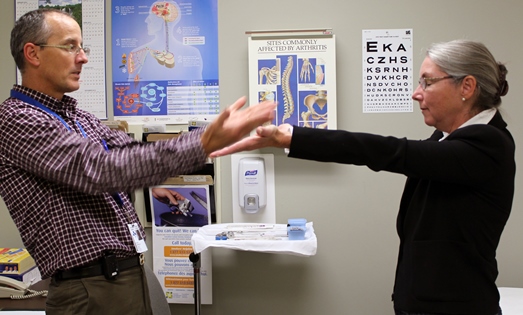
Dr. Shawn Marshall (left) conducted tests in September 2013 to assess how well patient Leah Braithwaite was progressing, after she was left with concussion symptoms that lingered for years.
Leah Braithwaite was knocked down by a beginner skier in February 2011. She suffered a concussion that was diagnosed right away, but she couldn’t shake her symptoms for years.
“It was an unremarkable fall, but the consequences on my work and family life have been anything but trivial,” said Braithwaite, an Ottawa mother of two who is also Chief of Applied Science for the Canadian Ice Service of Environment Canada.
Now, guidelines published by the Ontario Neurotrauma Foundation will help doctors and other health-care providers treat people like Braithwaite and manage their post-concussion symptoms.
Guidelines for Concussion/Mild Traumatic Brain Injury and Persistent Symptoms (2nd Edition) uses significantly updated evidence to support health-care providers who are helping adult patients such as Braithwaite return to normal life.
“Concussion is commonly thought of as a sports injury,” said Dr. Shawn Marshall, lead author of the guidelines and a physician at The Ottawa Hospital Rehabilitation Centre. “But the reality is that many concussions, or mild traumatic brain injuries, come from mishaps of daily living, such as slipping on the ice while walking the dog, falling down the stairs at home, or being in a car crash.”
Resting the brain is certainly the first priority, and this helps the vast majority of concussion patients. But the research in the updated guidelines shows that, when symptoms last for months, resting for too long can become detrimental. The guidelines include ways for health-care providers to objectively evaluate, monitor and manage symptoms, and provide concrete strategies and tools for returning to daily life.
Braithwaite did her best to manage on her own. She used sick leave and spent a lot of time in her darkened bedroom. She tried to go back to work in March 2011, but pressures and extended time working brought back fatigue, dizziness, headaches and vomiting.
“It was another four months before I saw someone familiar enough with concussions to actively address my symptoms and help me get back to work and my family,” said Braithwaite. “I hope these guidelines will help a lot of people start that journey sooner.”
Each year in Ontario, an estimated 80,000 people suffer a concussion, and 16,000 of those have lingering, troublesome symptoms for more than three months, based on numbers published in 2004. Now, these rates are widely thought to be considerably higher.
The guidelines are available at onf.org and ConcussionsOntario.org.

Support patient care and research at
The Ottawa Hospital


 To reset, hold the Ctrl key, then press 0.
To reset, hold the Ctrl key, then press 0.